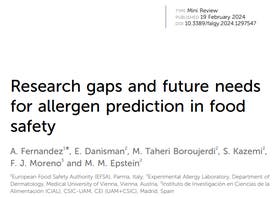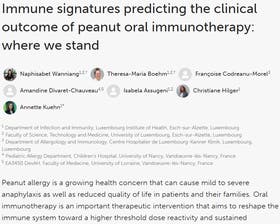Publications
ALLPreT publication in Frontiers in Allergy
12 July 2024
Abstract:
Antigen uptake and processing of exogenous proteins is critical for adaptive immunity, particularly for T helper cell activation. Proteins undergo distinct proteolytic processing in endolysosomal compartments of antigen-presenting cells. The resulting peptides are presented on MHC class II molecules and specifically recognized by T cells. The in vitro endolysosomal degradation assay mimics antigen processing by incubating a protein of interest with a protease cocktail derived from the endolysosomal compartments of antigen presenting cells. The kinetics of protein degradation is monitored by gel electrophoresis and allows calculation of a protein's half-life and thus endolysosomal stability. Processed peptides are analyzed by mass spectrometry and abundant peptide clusters are shown to harbor T cell epitopes. The endolysosomal degradation assay has been widely used to study allergens, which are IgE-binding proteins involved in type I hypersensitivity. In this review article, we provide the first comprehensive overview of the endolysosomal degradation of 29 isoallergens and variants originating from the PR-10, Ole e 1-like, pectate lyase, defensin polyproline-linked, non-specific lipid transfer, mite group 1, 2, and 5, and tropomyosin protein families. The assay method is described in detail and suggestions for improved standardization and reproducibility are provided. The current hypothesis implies that proteins with high endolysosomal stability can induce an efficient immune response, whereas highly unstable proteins are degraded early during antigen processing and therefore not efficient for MHC II peptide presentation. To validate this concept, systematic analyses of high and low allergenic representatives of protein families should be investigated. In addition to purified molecules, allergen extracts should be degraded to analyze potential matrix effects and gastrointestinal proteolysis of food allergens. In conclusion, individual protein susceptibility and peptides obtained from the endolysosomal degradation assay are powerful tools for understanding protein immunogenicity and T cell reactivity. Systematic studies and linkage with in vivo sensitization data will allow the establishment of (machine-learning) tools to aid prediction of immunogenicity and allergenicity. The orthogonal method could in the future be used for risk assessment of novel foods and in the generation of protein-based immunotherapeutics.
Link to the full paper:
https://www.frontiersin.org/journals/allergy/articles/10.3389/falgy.2024.1440360/full
Read more
ALLPreT publication in Frontiers in Allergy
19 February 2024
Abstract
The allergenicity and protein risk assessments in food safety are facing new challenges. Demands for healthier and more sustainable food systems have led to significant advances in biotechnology, the development of more complex foods, and the search for alternative protein sources. All this has increased the pressure on the safety assessment prediction approaches anchored into requirements defined in the late 90's. In 2022, the EFSA's Panel on Genetically Modified Organisms published a scientific opinion focusing on the developments needed for allergenicity and protein safety assessments of new products derived from biotechnology. Here, we further elaborate on the main elements described in this scientific opinion and prioritize those development needs requiring critical attention. The starting point of any new recommendation would require a focus on clinical relevance and the development of a fit-for-purpose database targeted for specific risk assessment goals. Furthermore, it is imperative to review and clarify the main purpose of the allergenicity risk assessment. An internationally agreed consensus on the overall purpose of allergenicity risk assessment will accelerate the development of fit-for-purpose methodologies, where the role of exposure should be better clarified. Considering the experience gained over the last 25 years and recent scientific developments in the fields of biotechnology, allergy, and risk assessment, it is time to revise and improve the allergenicity safety assessment to ensure the reliability of allergenicity assessments for food of the future.
Link to the full paper:
https://www.frontiersin.org/journals/allergy/articles/10.3389/falgy.2024.1297547/full
Read more
ALLPreT publication in Frontiers in Allergy
2 October 2023
Abstract
Peanut allergy is a growing health concern that can cause mild to severe anaphylaxis as well as reduced quality of life in patients and their families. Oral immunotherapy is an important therapeutic intervention that aims to reshape the immune system toward a higher threshold dose reactivity and sustained unresponsiveness in some patients. From an immunological point of view, young patients, especially those under 3 years old, seem to have the best chance for therapy success. To date, surrogate markers for therapy duration and response are evasive. We provide a comprehensive overview of the current literature state regarding immune signatures evolving over the course of oral immunotherapy as well as baseline immune conditions prior to the initiation of treatment. Although research comparing clinical and immune traits in the first years of life vs. later stages across different age groups is limited, promising insights are available on immunological endotypes among peanut-allergic patients. The available data call for continued research to fill in gaps in knowledge, possibly in an integrated manner, to design novel precision health approaches for advanced therapeutic interventions in peanut allergy.
Link to the full publication:
https://www.frontiersin.org/journals/allergy/articles/10.3389/falgy.2023.1270344/full
Read more
